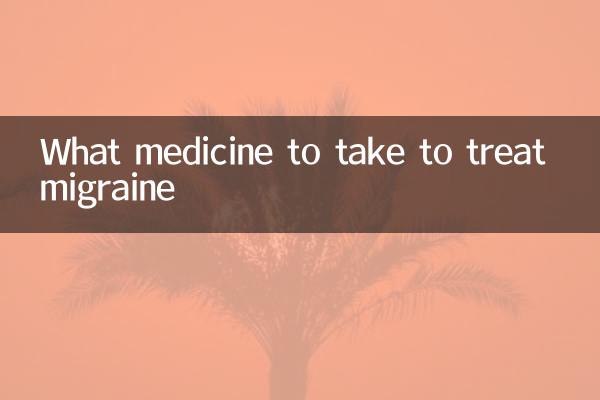What medicine to take to treat migraine: Popular topics and treatment plans on the entire network in the past 10 days
Migraine is a common neurological disease, manifested as repeated and severe headaches, often accompanied by symptoms such as nausea, vomiting, and photophobia. In the past 10 days, the entire network has conducted extensive discussions on the treatment of migraines, prevention methods and life adjustments. This article will combine the latest hot topics to provide you with structured data and analysis to help you understand the medication options for treating migraines.
1. Ranking of popular migraine treatment drugs in the past 10 days

According to the heat of discussion across the Internet, the following drugs are the most popular migraine treatment options recently:
| Drug name | type | Applicable scenarios | Popularity index |
|---|---|---|---|
| Ibuprofen | NSAIDs | Mild and moderate migraine | ★★★★☆ |
| Paracetamol | Antipyretic and analgesic drugs | Mild migraine | ★★★☆☆ |
| Triptan (such as sumatriptan) | Specific migraine medication | Moderate and severe attack | ★★★★★ |
| amitriptyline | Preventive drugs | Chronic migraine | ★★★☆☆ |
| Botox | Injection therapy | Stubborn migraine | ★★☆☆☆ |
2. Suggestions and precautions for the use of different drugs
1.Over-the-counter medicine (OTC): Such as ibuprofen and acetaminophen, are suitable for occasional mild migraines, but long-term use may cause drug-induced headaches.
2.Triptan drugs: As the first choice for acute phase treatment, it needs to be used under the guidance of a doctor and should be used with caution in patients with cardiovascular diseases.
3.Preventive drugs: Such as amitriptyline, propranolol, etc., are suitable for patients with more than 4 attacks per month and need to be taken continuously for several months to achieve results.
3. Non-drug therapy for migraines that has been hotly discussed across the Internet
In the past 10 days, the following non-drug therapy discussions have increased significantly:
| method | principle | Recommended index |
|---|---|---|
| Acupuncture | Adjust petal meridian qi | ★★★☆☆ |
| Magnesium Supplement | Relieve nerve excitability | ★★☆☆☆ |
| Regular movement | Reduce the frequency of attack | ★★★★☆ | かつtr>
4. Practical advice from doctors and patients
1.Record a headache diary: Including the time of onset, the cause (such as stress, food), and the effect of medication, to help doctors adjust their plans.
2.Avoid common triggers: Such as red wine, chocolate, lack of sleep, etc., the topic of "caffeine withdrawal" has caused heated discussions recently.
3.Timely medical consultation signal: If the headache suddenly worsens, accompanied by fever or disordered consciousness, you need to seek medical treatment immediately.
Summarize: The treatment of migraine requires combining drugs and non-drug methods, and individualized selection is the key. It is recommended to develop a long-term management plan under the guidance of a doctor and pay attention to the latest treatment progress (such as new drugs such as CGRP inhibitors).
(Note: The data in this article is compiled based on public network information. Please follow the doctor's advice for specific medication.)

check the details

check the details